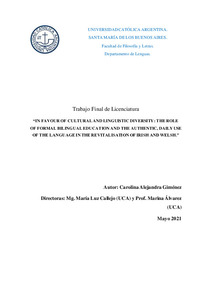Por favor, use este identificador para citar o enlazar este ítem:
https://repositorio.uca.edu.ar/handle/123456789/12494| Título: | In favour of cultural and linguistic diversity : the role of formal bilingual education and the authentic, daily use of the language in the revitalisation of irish and welsh | Autor: | Giménez, Carolina Alejandra | Director de Tesis: | Callejo, María Luz Álvarez, Marina |
Palabras clave: | LENGUAS CELTAS; LENGUAS INDÍGENAS; LITERATURA COMPARADA; CULTURA CELTA; LINGÜISTICA; EDUCACION BILINGÜE; DIVERSIDAD CULTURAL | Fecha de publicación: | 2021 | Cita: | Giménez, C. A. In favour of cultural and linguistic diversity : the role of formal bilingual education and the authentic, daily use of the language in the revitalisation of irish and welsh [en línea]. Tesis de Licenciatura. Pontificia Universidad Católica Argentina. Facultad de Filosofía y Letras. Departamento de Lenguas y Literatura Inglesa, 2021. Disponible en: https://repositorio.uca.edu.ar/handle/123456789/12494 | Resumen: | Abstract: Introduction Within the European continent, there are several autochthonous languages that are, or were, close to extinction, as a result of the political and cultural dominion of another language that was designed as the official one for the state: for instance, in the United Kingdom, English is the official language, and has managed to overshadow autochthonous languages such as Welsh. It is the case of languages like Catalan, Galego, Basque, Frisian, Scottish Gaelic, the various indigenous languages in Argentina, Irish, or Welsh. The last two will be the focus of the following thesis: both belong to the linguistic branch of Celtic languages, and are spoken mostly in Ireland and Wales, respectively. The indigenous languages in Argentina will also be discussed in this thesis, as they present similarities with Irish and Welsh. Having been interested in Celtic culture from a young age, I considered studying the development, difficulties faced and revival of two Celtic languages an important contribution to my chosen area of studies, Sociolinguistics, and which I believe to be important within a multicultural context as the one we are currently part of. When I speak of revival, I refer to how, in spite of being near extinction in previous centuries, from the 1980’s onwards, a process of revitalization has developed that has allowed these two languages to flourish once more. However, the status of English as a lingua franca, and the specific dominion of the British crown –both political and cultural- over the two countries where the languages are still spoken, make this revitalization more difficult. For an explanation of the status quo of these two languages at the beginning of the 21st century, Sutherland (2000) will be used as a point of reference. | Cobertura Temporal: | SIGLO XXI | URI: | https://repositorio.uca.edu.ar/handle/123456789/12494 | Disciplina: | LITERATURA | Derechos: | Acceso abierto |
| Aparece en las colecciones: | Tesis de Licenciatura en Lenguas y Literatura Inglesa |
Ficheros en este ítem:
| Fichero | Descripción | Tamaño | Formato | |
|---|---|---|---|---|
| favour-cultural-linguistic.pdf | 632,68 kB | Adobe PDF |  Visualizar/Abrir |
Visualizaciones de página(s)
334
comprobado en 27-abr-2024
Descarga(s)
233
comprobado en 27-abr-2024
Google ScholarTM
Ver en Google Scholar
Este ítem está sujeto a una Licencia Creative Commons

